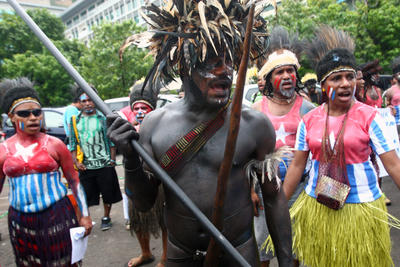because issues regarding the province have never been properly addressed since it was integrated into Indonesia in 1969; in turn, this seems to haunt every Indonesian president.
Given the limited knowledge about both candidates’ views on Papua, it makes sense to review efforts that have been undertaken so far. Two main initiatives are underway. The current President Susilo Bambang Yudhoyono’s legacy is a draft Act on Special Autonomy Plus (Otsus Plus). This regulation is a renewal of the first Special Autonomy Act No. 21, 2001. There are high hopes that the draft of Otsus Plus will overcome prolonged problems in Papua and West Papua, as it would extend the authority of provincial governments to manage their local problems. But as reported by the Institute for Policy Analysis of Conflict this draft has not been concluded due to different views from the two provincial governments in Papua.
This Otsus Plus draft has been criticised as elitist — as there was no input collected from local Papuans — and is not seen as legitimate by Papuans. They only see this draft as an agreement between the central government and local governments to protect their own interests. For the central government this draft is another way to suppress ideas of Papuan independence and maintain its grip over Papua’s natural resources. On the other hand, local governments see this regulation as a source of income for elites and their cronies.
In sum, the Papuans will still be neglected.
But at the grassroots there is a strong push to hold constructive dialogue to settle Papua’s problems. This move was initiated in 2010 by the Papuan Peaceful Network (JDP) and has been coordinated by Papuan priest Neles Tebay and Indonesian Institute of Sciences scholar Muridan Widjojo. JPD has been holding consultations that involve all political factions, including Papuan international political figures, and other stakeholders in Papua. So far, the consultations have been held in Wamena, Timika, Biak, Enarotali and Merauke.
JDP has identified four basic problems in Papua: political and historical status; marginalisation and discrimination; failure of development; and state violence and rights violations. But since 2012, this consultation has been halted temporarily due to financial problems. According to Muridan, to hold a consultation across Papua, JDP needs financial support from the government. Yet since 2012 the central government has seemed unwilling to fund this effort. The central government is suspicious of the idea of independence suggested in the consultation — particularly because suggestions came from some hardline groups, including the Free Papua Movement.
Jokowi and Prabowo have to decide whether they will continue the consultations across Papuan lands.
As a reformer, Jokowi should focus on continuation. The consultations are the only way to know deeply and thoroughly what Papuans need. In turn, the central government can form policy that positively affects Papuans.
A network of various political actors in Papua has been set up through the consultations and it would be constructive if the central government held discussions with these actors — particularly those who are living and struggling for Papuan independence from abroad. The international campaign has been intense. By supporting consultation with the people, the government can send a strong signal about building trust and eliminating suspicions regarding Papua.
But given Prabowo’s background, it seems unlikely that he will support the consultation process if he is elected. Although Prabowo has exhibited a democratic view on many occasions, his firm military background and past human rights record will influence his decision about Papua. He is likely to continue the process of reviewing the Otsus Plus draft, even though it contains many weaknesses. In this regard, Otsus Plus could pave the way to tighter control of Papuans. Additionally, he seems likely to suppress Papuans’ freedom of expression, which could worsen conditions in the province.
Both leading candidates must make Papua one of their main concerns during the presidential campaign if they want Papua to remain part of Indonesia. For Papuans, the 2014 election is still seen as merely a faraway political process for the elites. Yet the impact after the election could be very detrimental to their lives.
Hipolitus Yolisandry Ringgi Wangge is Visiting Scholar in the Equality Development and Globalization Studies Program at the Buffet Center for International and Comparative Studies, Northwestern University.

